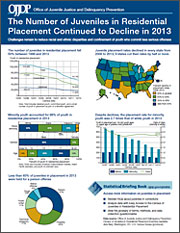OJJDP Administrator Reflects on In re Gault at Juvenile Defender Leadership Summit
 “Nearly 50 years after In re Gault, still too many children and youth appear in court without legal representation,” said Administrator Listenbee speaking at the 2015 Juvenile Defender Leadership Summit. “Three issues—quality representation, improving access to counsel, and training for public defenders—remain a high priority for indigent defense.”
“Nearly 50 years after In re Gault, still too many children and youth appear in court without legal representation,” said Administrator Listenbee speaking at the 2015 Juvenile Defender Leadership Summit. “Three issues—quality representation, improving access to counsel, and training for public defenders—remain a high priority for indigent defense.”
Sponsored by the National Juvenile Defender Center, the summit took place October 23–25, 2015, in Salt Lake City, UT, and was attended by more than 350 people. The purpose of the annual summit is to energize and inspire members of the juvenile defense bar, specifically juvenile public defenders, who are often faced with staggering caseloads, extremely limited resources, and a juvenile justice system that is fraught with racial and ethnic bias. Allowing those issues to go unaddressed, and youth to continue appearing without adequate counsel, unduly exposes them to potential civil rights and equal protection violations, as well as a lack of meaningful understanding of the proceedings and the long-term collateral consequences of particular pleas.
Mr. Listenbee spoke on the theme, “50 Years After the Supreme Court Decided In re Gault: A Time for Reflection,” and reminded summit attendees that, “Although In re Gault initially provided—at least constitutionally—more representation for system-involved minors … those protections are simply still not a reality for many of America’s system-involved youth.”
In fiscal year 2015, OJJDP launched the Smart on Juvenile Justice: Enhancing Youth Access to Justice Initiative. The initiative will fund programs and provide training and technical assistance that will improve the quality of indigent defense services nationally. It will also increase the effectiveness of state indigent defense delivery systems.
OJJDP Awards More Than $266 Million in Grants in Fiscal Year 2015
In fiscal year 2015, OJJDP awarded $266.6 million to help at-risk youth, protect children, and improve juvenile justice systems nationwide. The 360 awards were made through discretionary and formula grant funding.
More than $227 million in discretionary grants was awarded in fiscal year 2015. OJJDP awarded $77 million to support youth mentoring programs. More than $25 million was awarded under the National Center for Missing & Exploited Children program, which offers critical intervention and prevention services to families and supports law enforcement agencies at the federal, state, and local levels in cases involving missing and exploited children. In addition, the Office distributed $21.4 million to state and local law enforcement agencies under its Internet Crimes Against Children Task Force Program to support joint federal, state, and local efforts to investigate and prosecute technology-facilitated sexual exploitation crimes against children and to keep children safe from Internet predators.
Discretionary grants were awarded in a range of other areas, including juvenile justice reform and reinvestment, reducing racial and ethnic disparities, at-risk and justice system-involved girls, indigent defense, reentry, youth violence prevention, police and youth engagement, dual-system youth, drug courts, and tribal youth.
Funding through formula grants is available to states and territories through the state agency designated by the Governor. Juvenile justice specialists in each state administer the funding through subgrants to units of local government, local private agencies, and federally recognized American Indian and Alaska Native jurisdictions for programs in accordance with legislative requirements. In FY 2015, OJJDP awarded more than $39 million under the following formula grants programs:
- Title II Formula Grants Program: $38.7 million
- Prison Rape Elimination Act Reallocation Funds: $530,980
See additional Highlights of OJJDP's Fiscal Year 2015 Awards.
For more information about the Office’s awards, visit OJJDP’s Funding webpage.
Data Snapshot Shows Decline in Number of Youth in Residential Placement
A data snapshot of OJJDP’s Census of Juveniles in Residential Placement shows that the number of youth in residential placement fell 50 percent between 1999 and 2013. However, racial and ethnic disparities remained.
According to the data, in 2013, minority youth were held in residential placement at 2.7 times the rate of white youth, accounting for 68 percent of the total population of youth in placement. The data also show that less than 40 percent of youth in placement in 2013 were held for a person offense.
View the data snapshot, which also displays the percentage decline in placement rates by state from 2006 to 2013.
OJJDP Staff Receive AAG Awards
On December 9, 2015, the Office of Justice Programs’ Assistant Attorney General (AAG), Karol V. Mason, presented awards for outstanding employee achievement. The following OJJDP staff were recognized:
- Program Manager Kara McDonagh (AAG Distinguished Service Award), for her leadership in advancing OJJDP’s work with tribal youth through the Today’s Native Leaders project.
- Program Manager and Team Lead Geroma Void (Violence Reduction Network Launch Team Award), for her contributions to the U.S. Department of Justice’s Violence Reduction Network, including supervision of one of the pilot sites, Camden, NJ.
- Grant Management Specialist Leanetta Jessie (New Employee of the Year Award), for her work in support of the Office’s juvenile drug court and community supervision improvement efforts.
“Tribal youth, violence reduction in our cities, and juvenile drug courts are among the top priorities at OJJDP,” said Administrator Listenbee. “It is gratifying to see the recognition of the hard work and dedication of our staff in these important areas.”
Marilyn Bruguier Zimmerman Joins OJJDP as Senior Tribal Policy Advisor
OJJDP is pleased to announce that Marilyn Bruguier Zimmerman, former director of the National Native Children’s Trauma Center and associate director of the Institute for Educational Research and Services at the University of Montana, has joined the Office as Senior Tribal Policy Advisor.

In her new role, Ms. Bruguier Zimmerman will provide guidance and advice to the OJJDP Administrator on strategies to improve outcomes for American Indian and Alaska Native youth—living on and off reservations—who are at risk of justice system involvement or victimization.
Ms. Bruguier Zimmerman served on both the Commission to Eliminate Child Abuse and Neglect Fatalities and the Attorney General’s Advisory Committee on American Indian and Alaska Native Children Exposed to Violence, the latter of which issued its final report, Ending Violence So Children Can Thrive in November 2015. In her role as Senior Tribal Policy Advisor, Ms. Bruguier Zimmerman will have the opportunity to continue this work and act on the recommendations contained in this groundbreaking report.
Ms. Bruguier Zimmerman is an enrolled member of the Assiniboine-Sioux tribes of the Fort Peck reservation. She has extensive experience working directly with tribes and is an expert in the areas of children’s exposure to violence, traumatic grief, suicide prevention, domestic violence, sexual assault, substance abuse, and juvenile justice.
